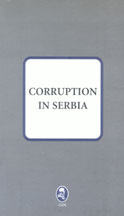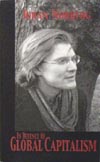Fisher Awards
Sir Antony Fisher International Memorial Awards - Overview
Available for Purchase: Books for Freedom – A History of the Fisher Awards
Winners of the 2005 Fisher Awards
Previous Winners: 2004 , 2003 , 2002 , 2001 , 2000 , 1999 , 1998 , 1997 , 1996 , 1995 , 1994 , 1993 , 1992 , 1991 , or 1990
Rules and Deadlines for Submitting Nominations
(Spanish version)Fisher Award Judges
WINNERS OF THE 2002 FISHER AWARDS
 Center for Liberal-Democratic Studies, Belgrade, Yugoslavia
Center for Liberal-Democratic Studies, Belgrade, Yugoslavia
Corruption in Serbia by Boris Begovic and Bosko Mijatovic
Center for Liberal-Democratic Studies, Belgrade, Yugoslavia, 2001
For countries trying to make the transition from state communism to market economies, the issue of corruption has proved
to be major problem that squanders resources and erodes public confidence in emerging institutions. Corruption in
Serbia makes an important contribution by analyzing how corruption has become institutionalized over the past decade,
based on the Center for Liberal-Democratic Studies’ original survey research of public perceptions about corruption.
As one Fisher Award judge put it: “It is the first book to integrate a historical perspective, economic theory and
statistics to produce an analysis of corruption in key public sector bodies.”
As part of a broad project – also called “Corruption in Serbia” – the book was fully integrated with the center’s
efforts to bring its findings and recommendations to opinion leaders. Top Serbian political leaders, governmental
agency officials, judges and lawyers, and a wide range of other community leaders, participated in the center’s
international conference on corruption, which was held in Belgrade in September 2001.
To improve distribution of the book’s findings, the Center for Liberal-Democratic Studies has made entire text of
the book available for download as a PDF file on its Web site.
 Timbro, Stockholm, Sweden
Timbro, Stockholm, Sweden
In Defence of Global Capitalism by Johan Norberg
Timbro, Stockholm, Sweden, 2001
Recent years have seen increased levels of activitism from the leftist organizations that rail against the specter
of “globalization.” Most famously, demonstrations outside the 1999 meeting of the World Trade Organization in Seattle
turned violent and garnered much media attention for those who blame a host of ills on capitalism.
In Defence of Global Capitalism delivers a methodical,
hard-hitting rebuttal to those who blame free enterprise and free trade
for poverty, inequality and environmental degradation. Author Johan
Norberg takes a systematic look at these accusations, and uses
statistics, specific examples, and clearly articulated logic to build a
foundation for understanding why open markets bring prosperity. The
Timbro book shows how nations adopting free-market policies have
prospered, while those that cling to anti-globalization myths continue
to suffer lower standards of living across virtually every measure.
In his easily accessible language, Norberg makes a compelling case for accelerating globalization by enhancing freedom
of movement of goods, services and people. The writing style is easy to understand, with no advanced knowledge of
economics necessary. Yet, as one reviewer wrote, “I can only wish that more of my fellow professional economists
understood the economics of free trade as deeply as this author understands this case.”
Shortly after the English edition of this book hit the press, institutes around the world began exploring translation
opportunities. Thanks to the generosity of Timbro, which readily granted reprint rights, both German and Turkish
editions are currently in production, and are likely to be followed by many other language editions.
Atlantic Institute for Market Studies, Halifax, Nova Scotia, Canada
The Equalization Initiative with the Frontier Centre for Public Policy (Winnipeg, Manitoba, Canada)
and the Institut Économique de Montréal (Quebec, Canada)
Special Recognition Award for Innovative Projects
Sir Antony Fisher envisioned a worldwide network of collaborating free-market institutes, each leveraging their
competitive advantages, but also working together to enhance their combined strength. The 2002 Innovative Award
is a wonderful manifestation of that vision.
Three Canadian institutes – Atlantic Institute for Market Studies, Frontier Institute and the Institut Économique
de Montréal – launched a collaborative project called The Equalization Initiative. In Canada, “equalization”
is a federal program of income transfer from wealthy to poor provinces. In this project, free-market institutes
from provinces on the receiving end of these transfers explain that the unintended consequences of equalization
actually harm the intended beneficiaries.
The project reached beyond the traditional methods of producing opinion-editorials, research papers, and media
interviews. Brian Crowley, president of the Atlantic Institute for Market Studies (AIMS), developed an idea to
invite Nobel Laureate James Buchanan to create a platform for the three institutes to collaboratively push forward
their efforts. Buchanan agreed and worked with the groups to create a national event of panel discussions,
interviews, and lectures, attracting excellent coverage in the national media.
The innovative approach – of using a coordinated range of communication tools and integrating the work of three
institutes – allowed our Canadian colleagues to transform this from a regional issue to one of national significance.
For this, Atlas was pleased to offer a Special Recognition Award to Atlantic Institute for Market Studies, the lead
institute and the one that officially nominated the project. In typically courteous Canadian fashion, AIMS accepted
the award on behalf of all three institutes.